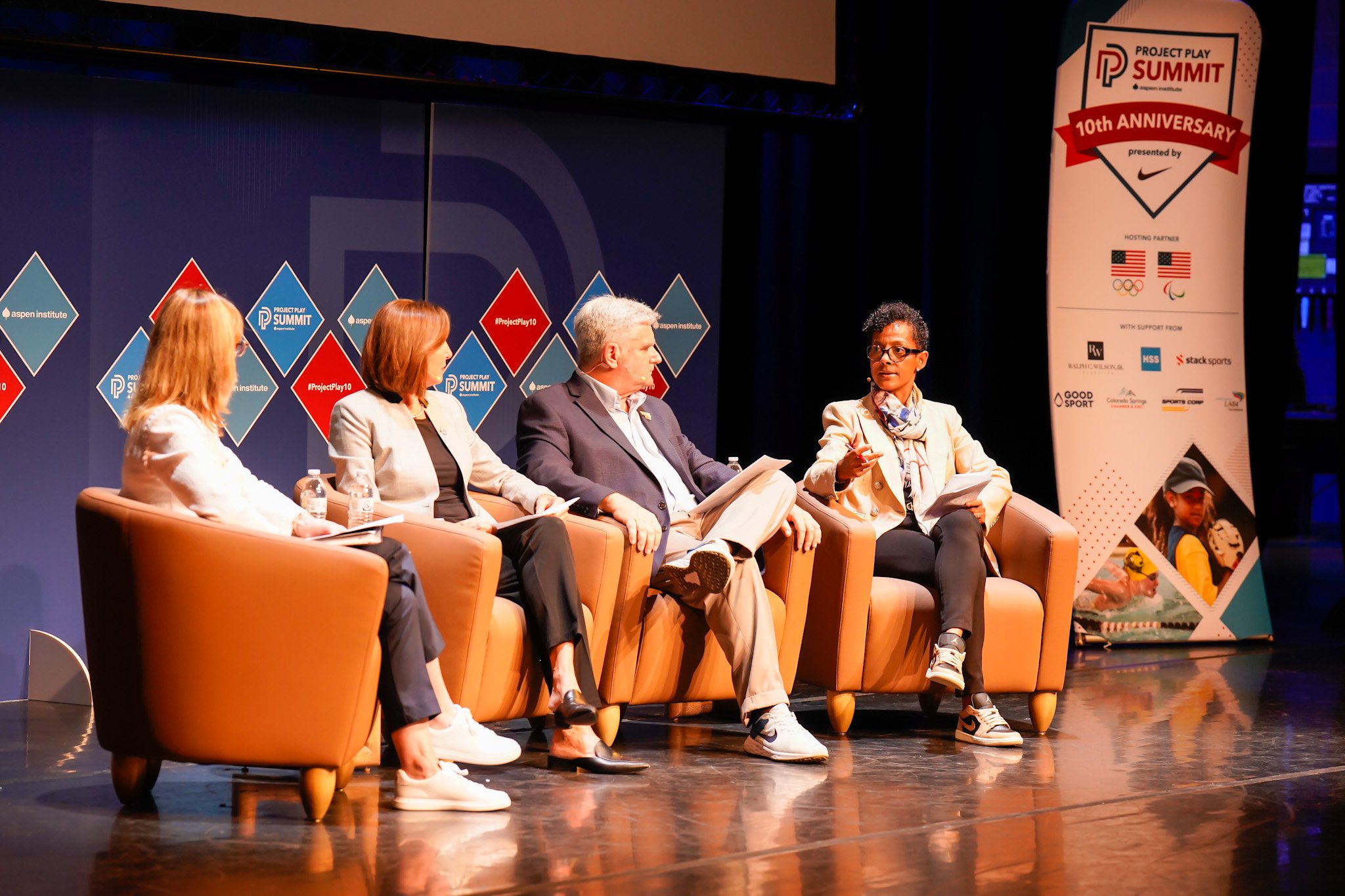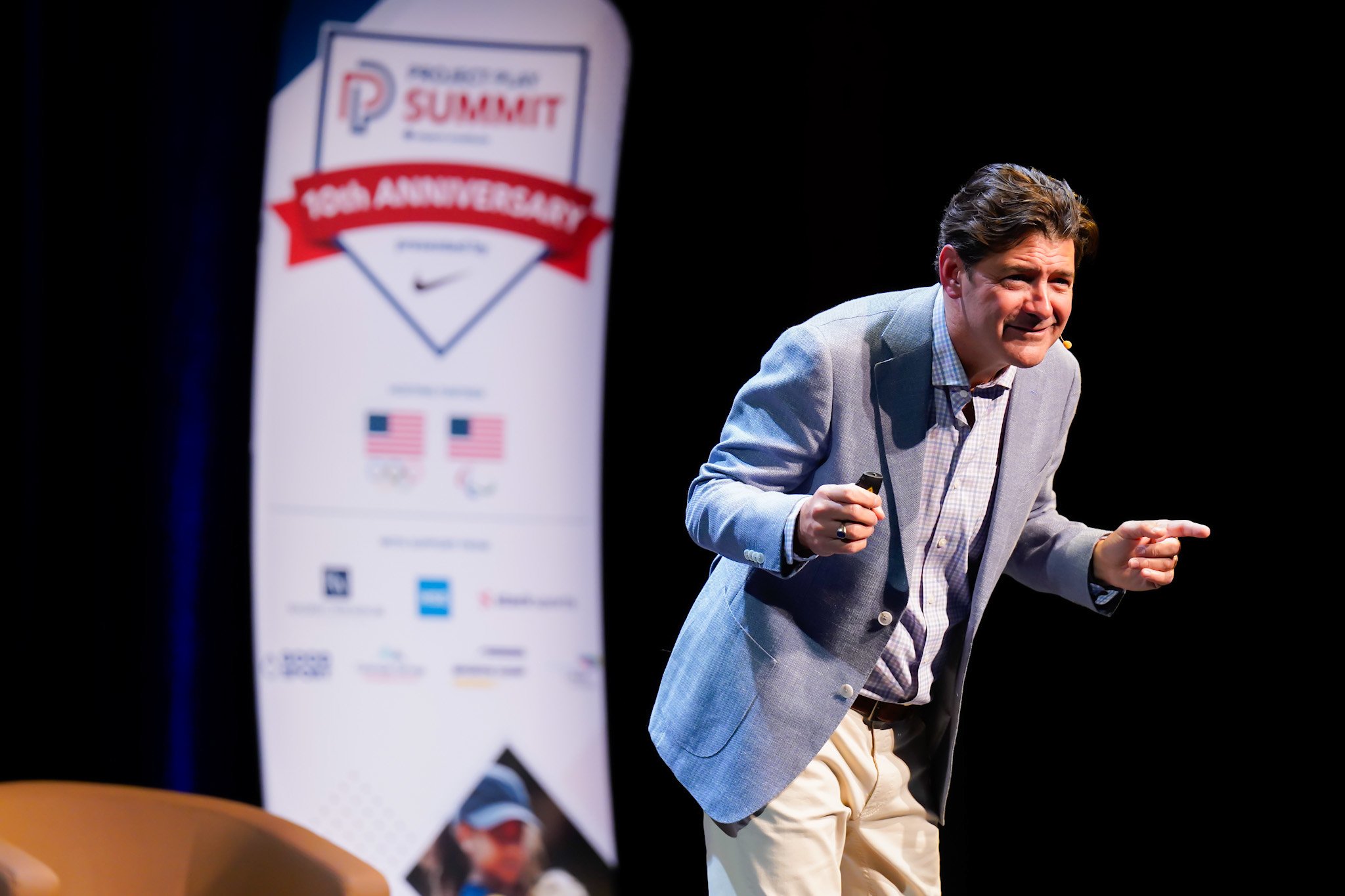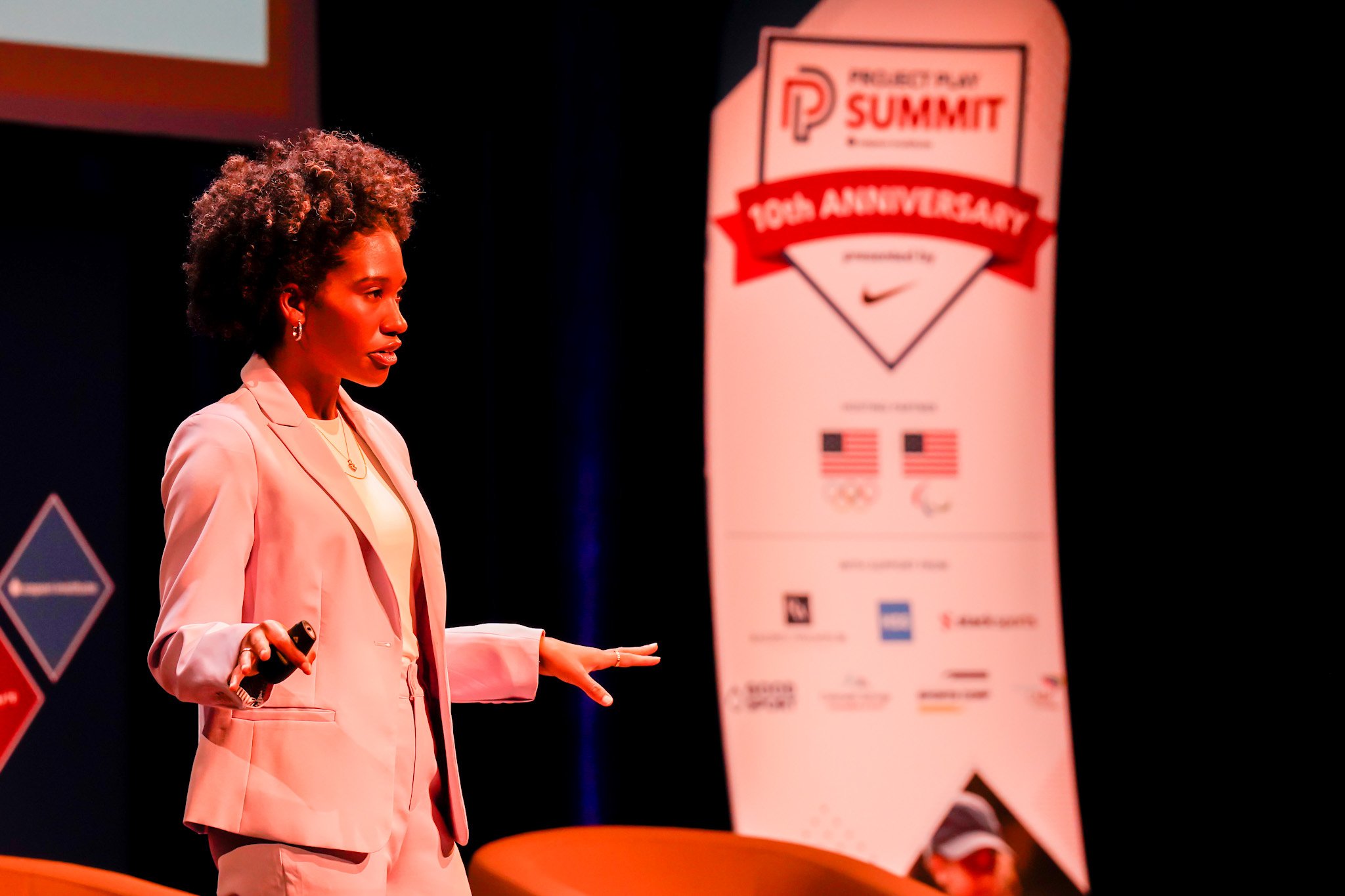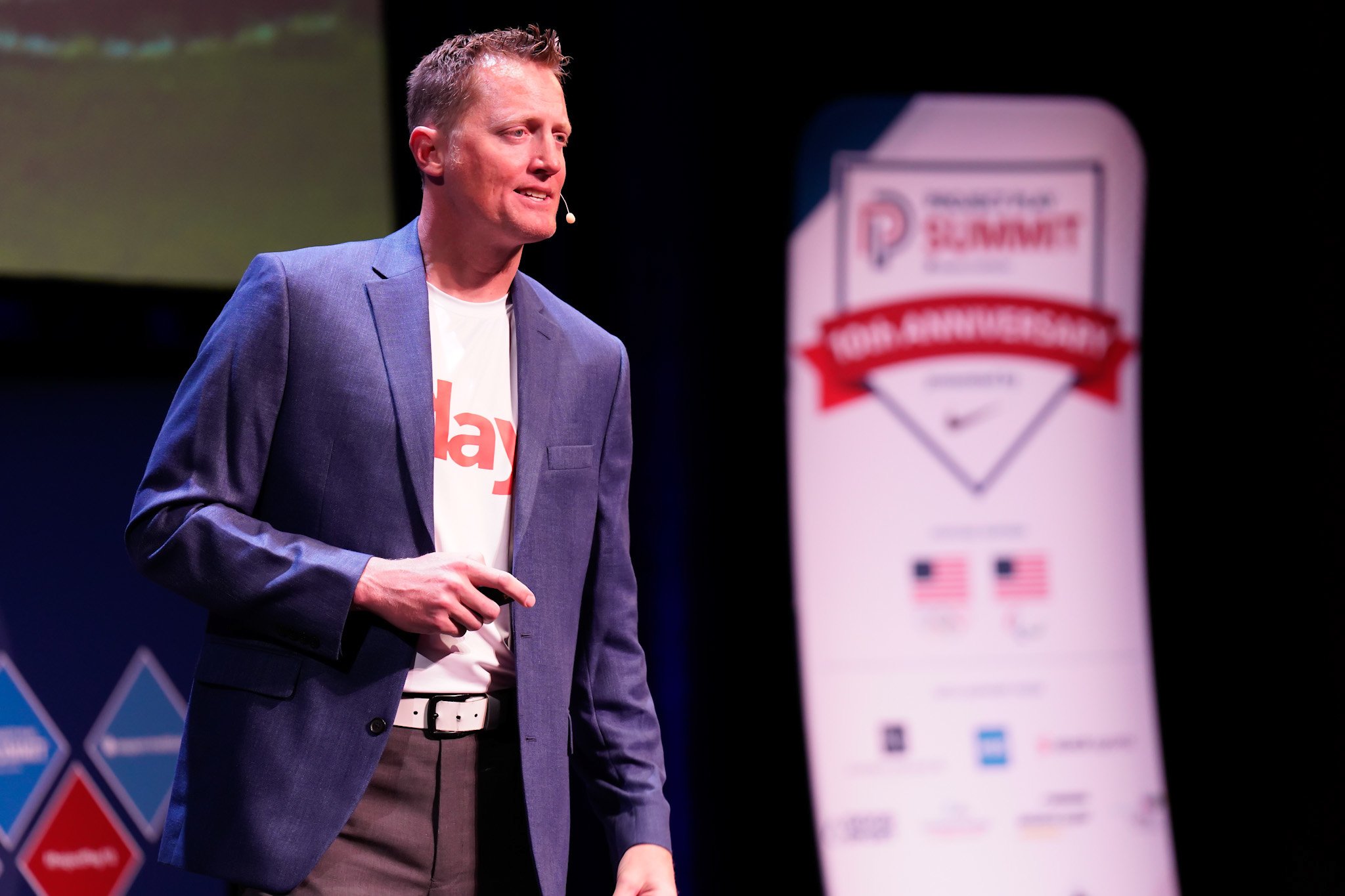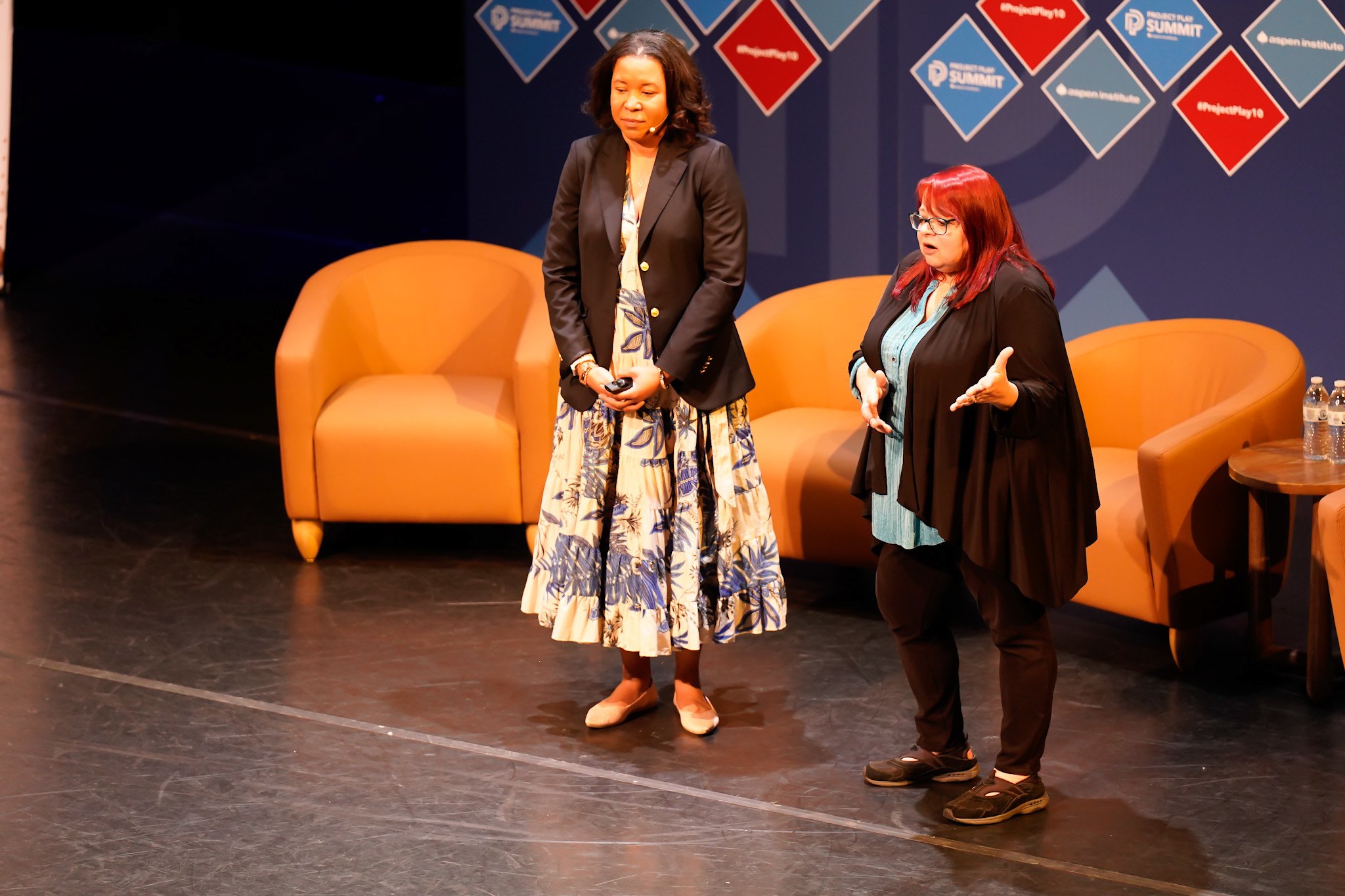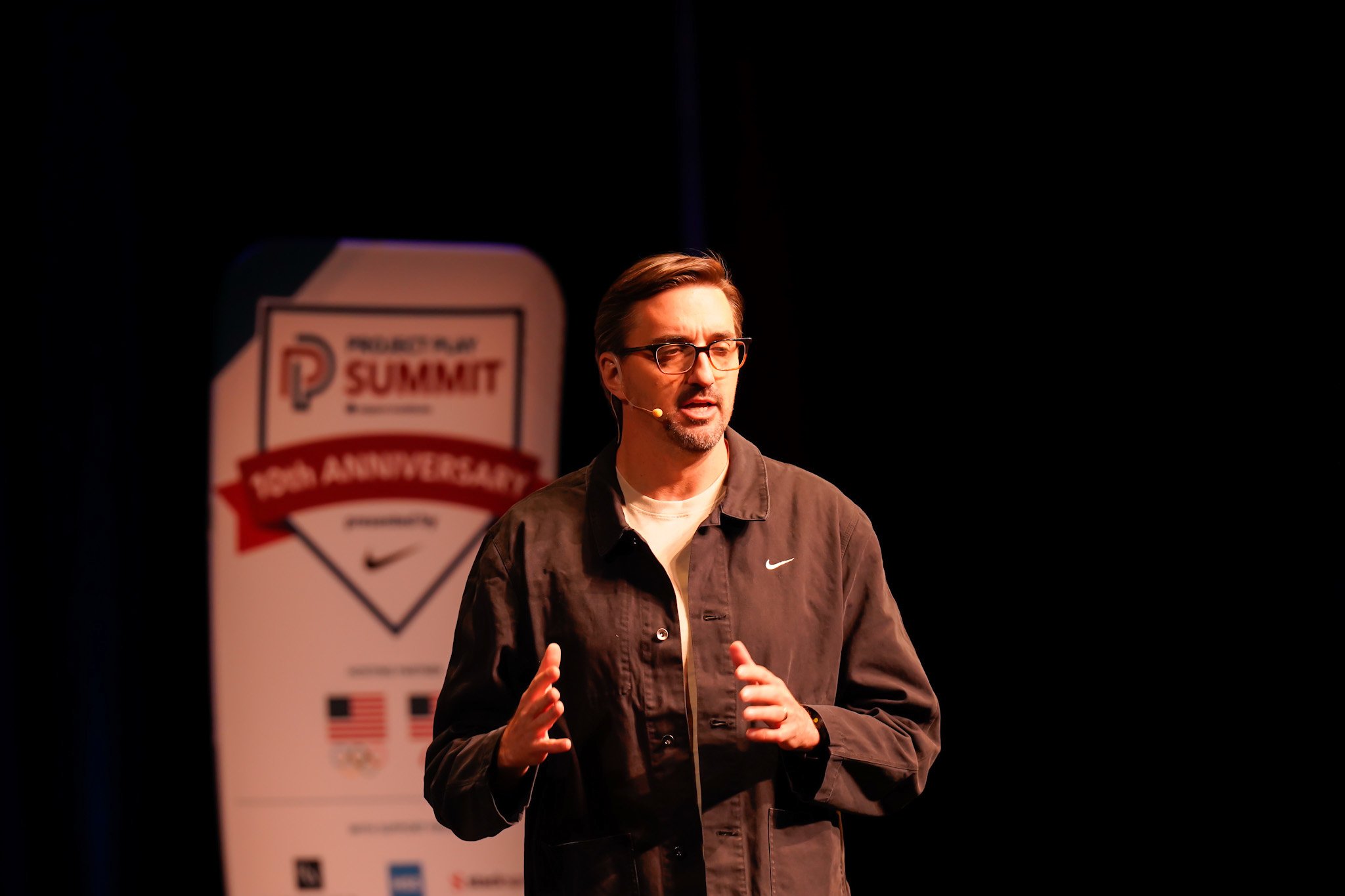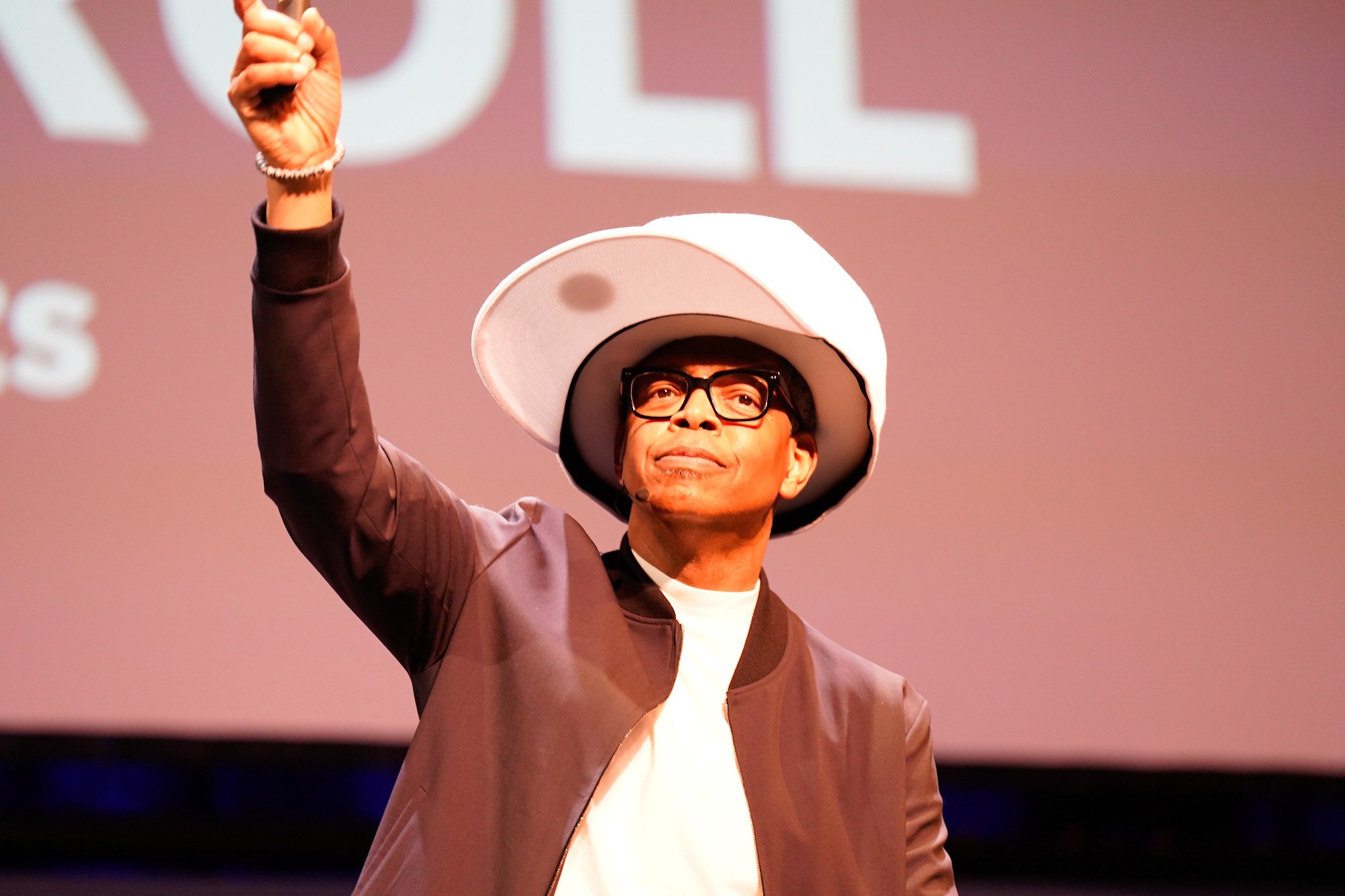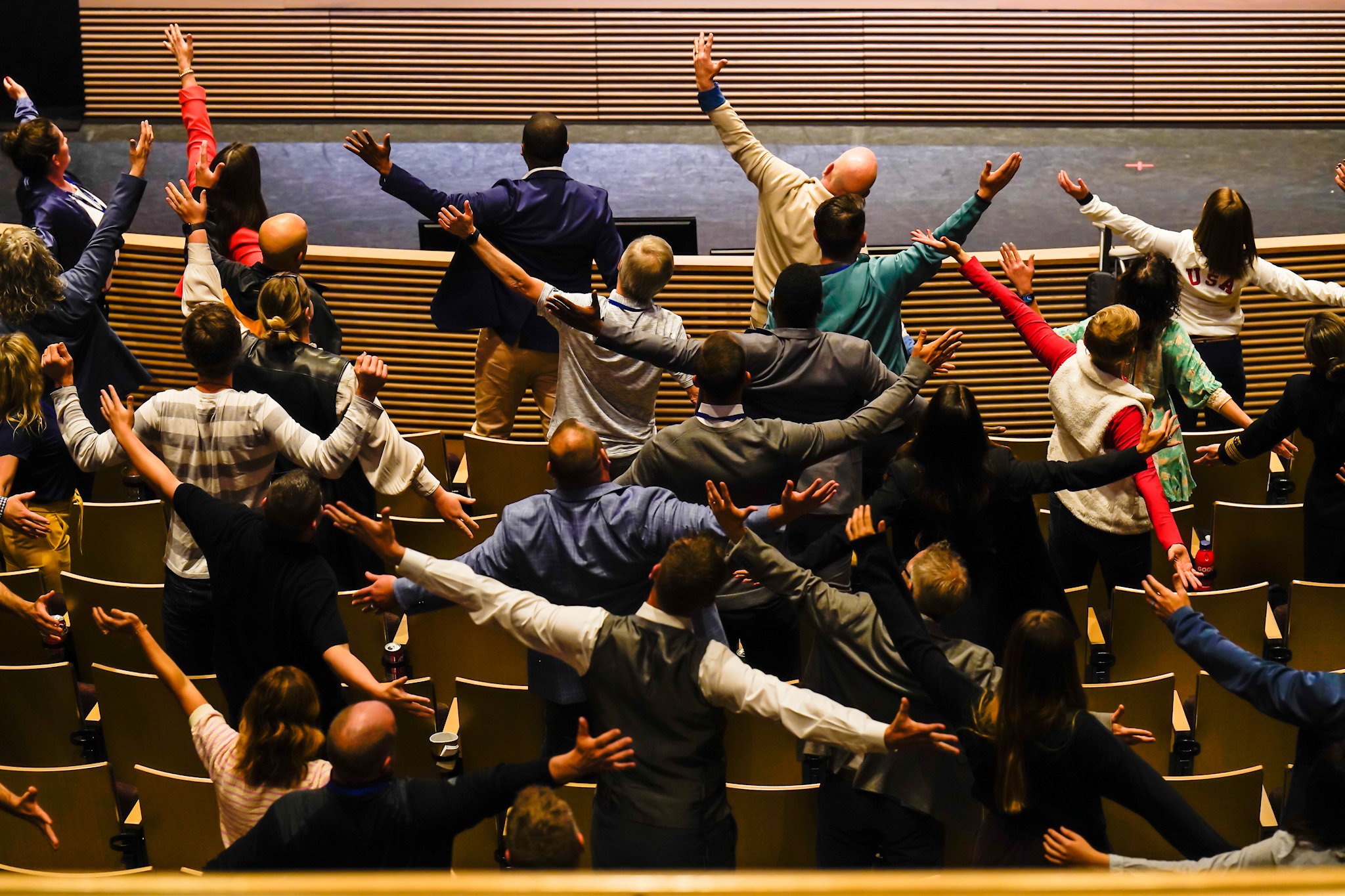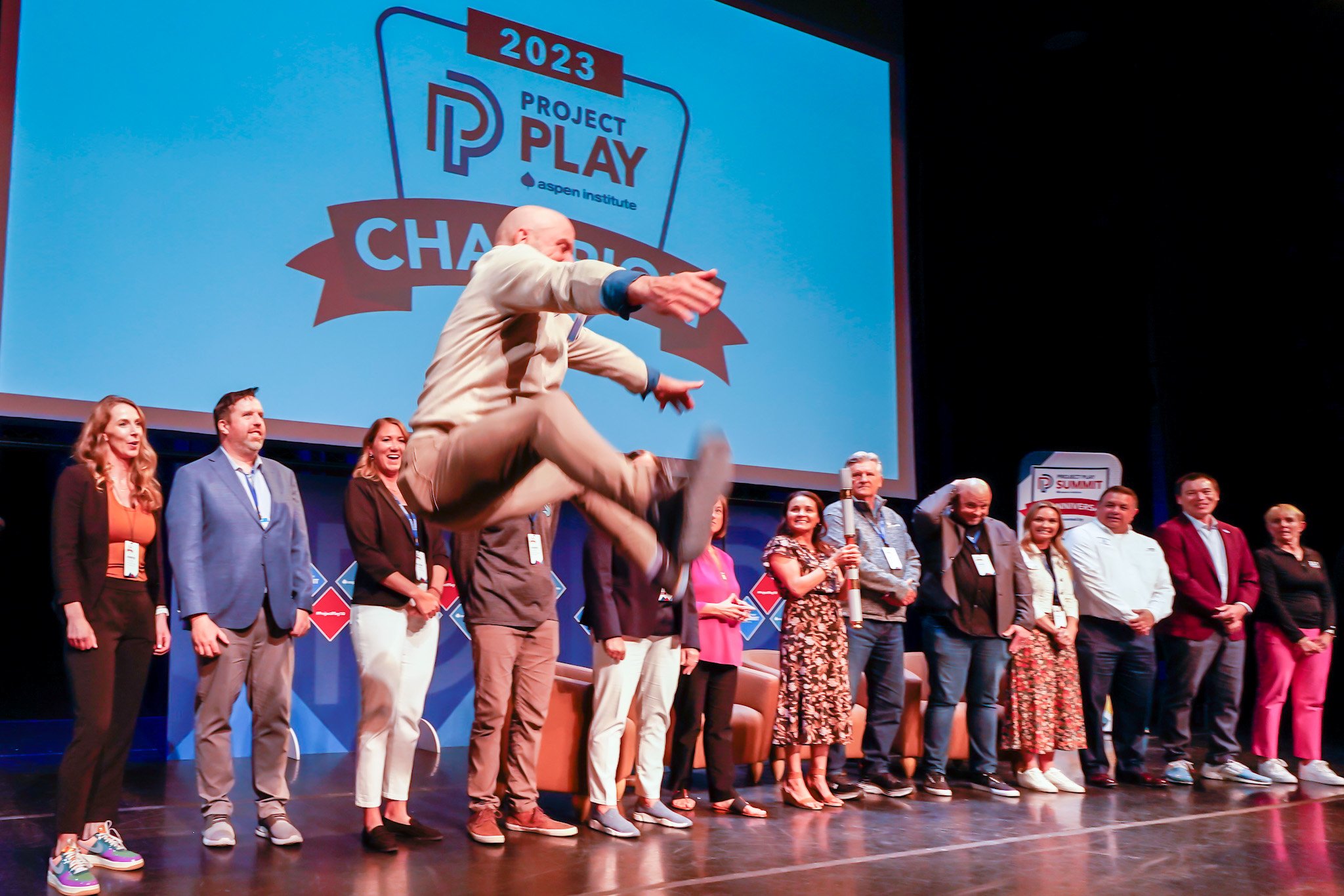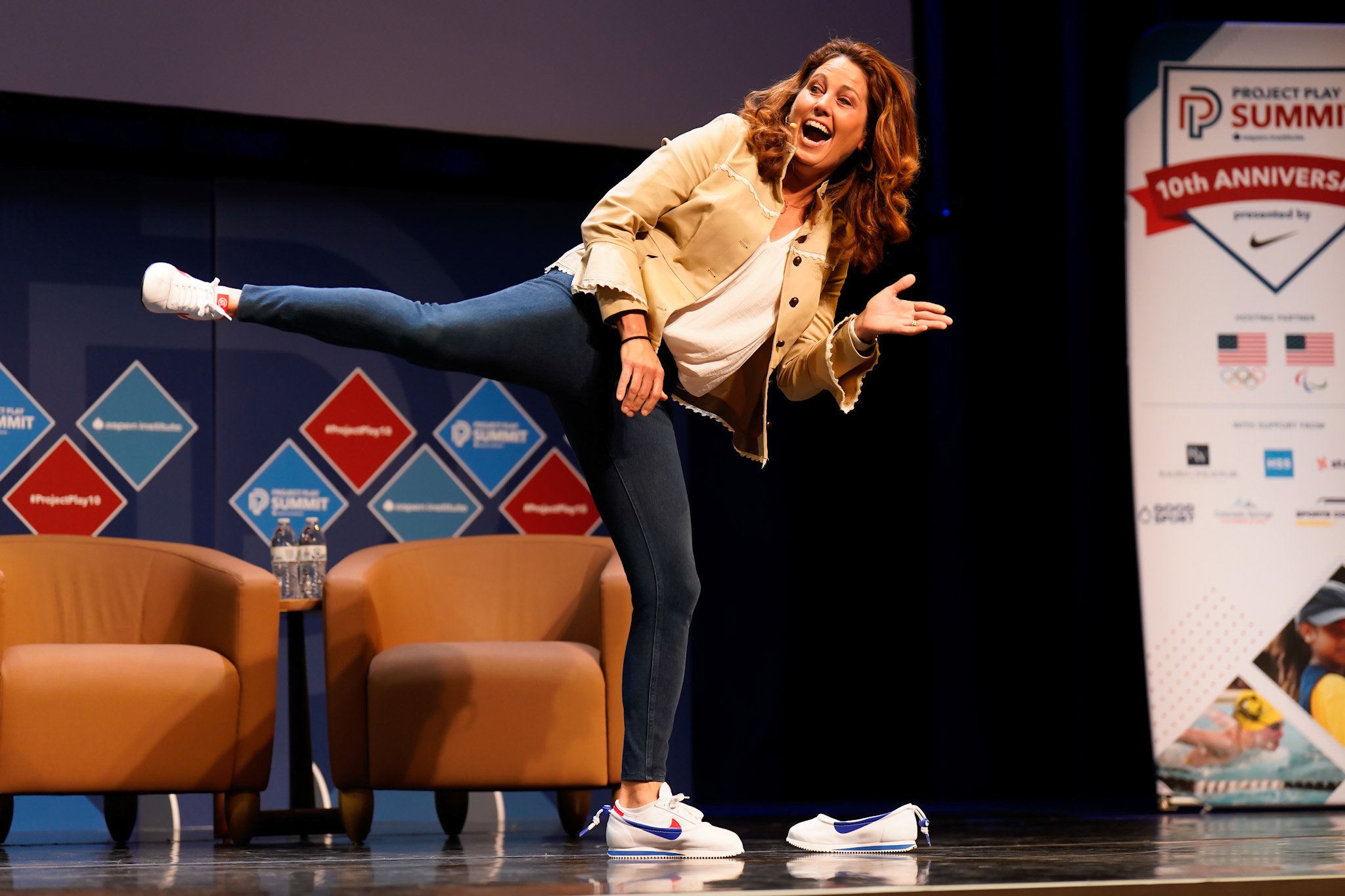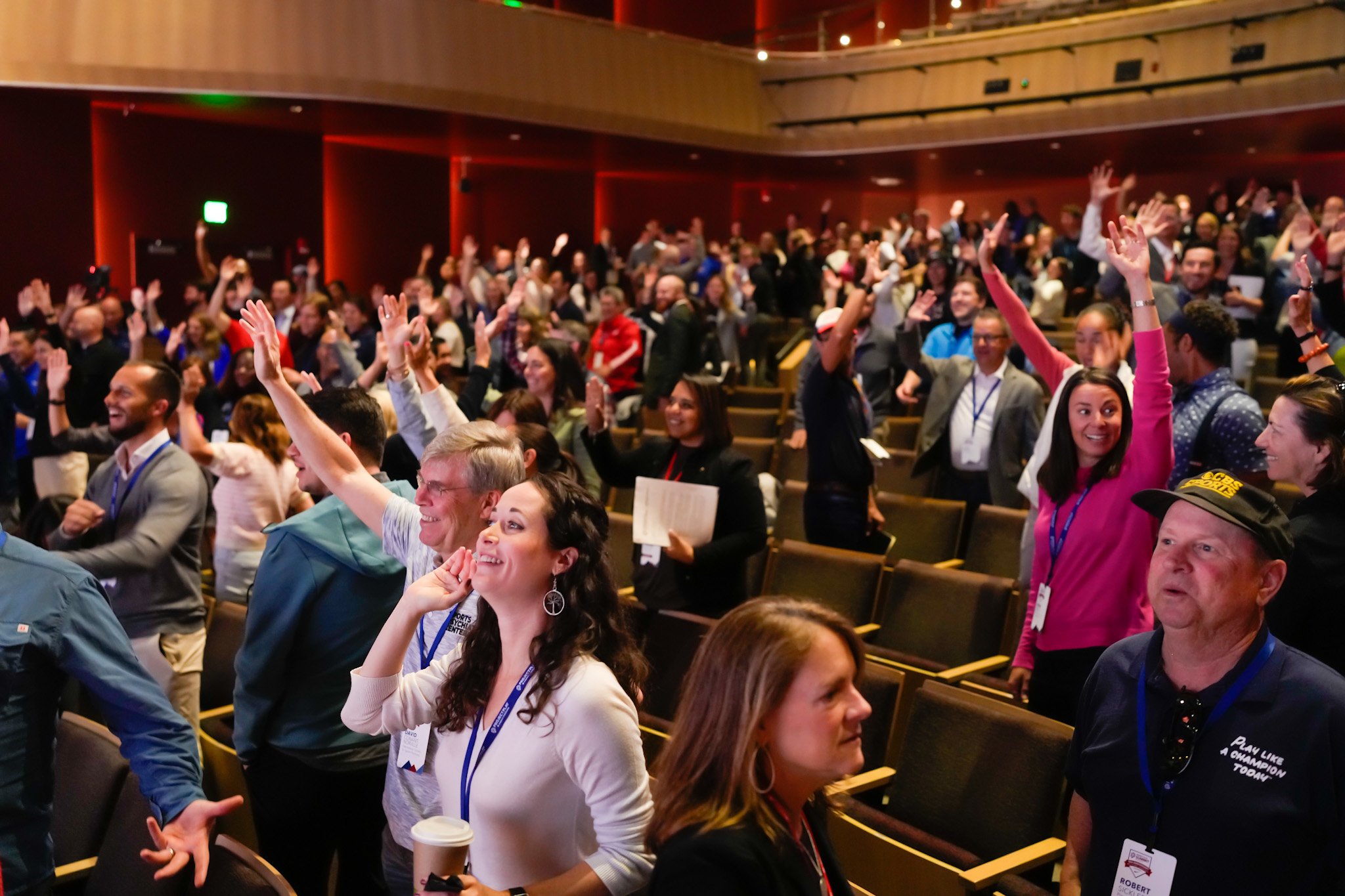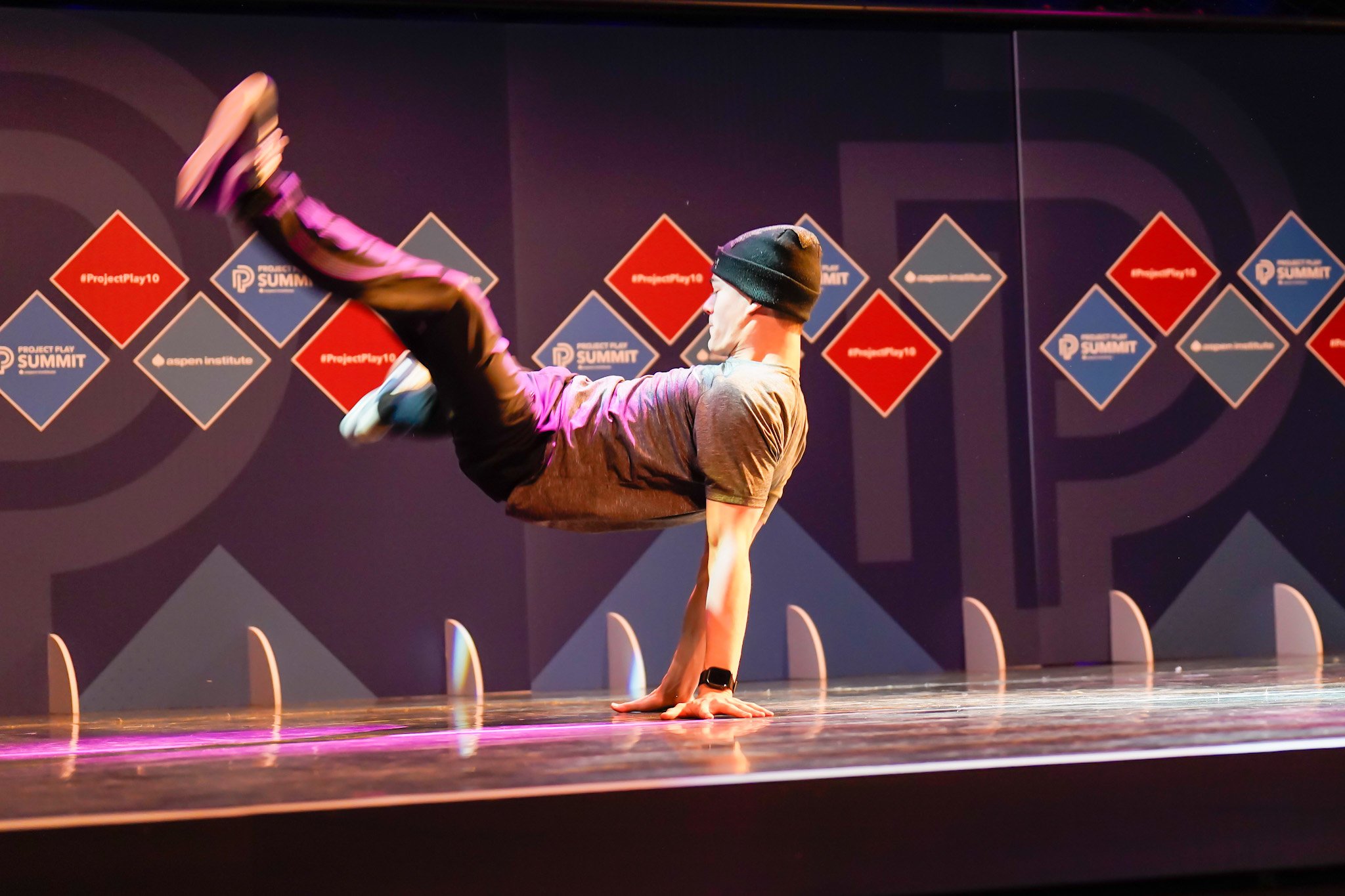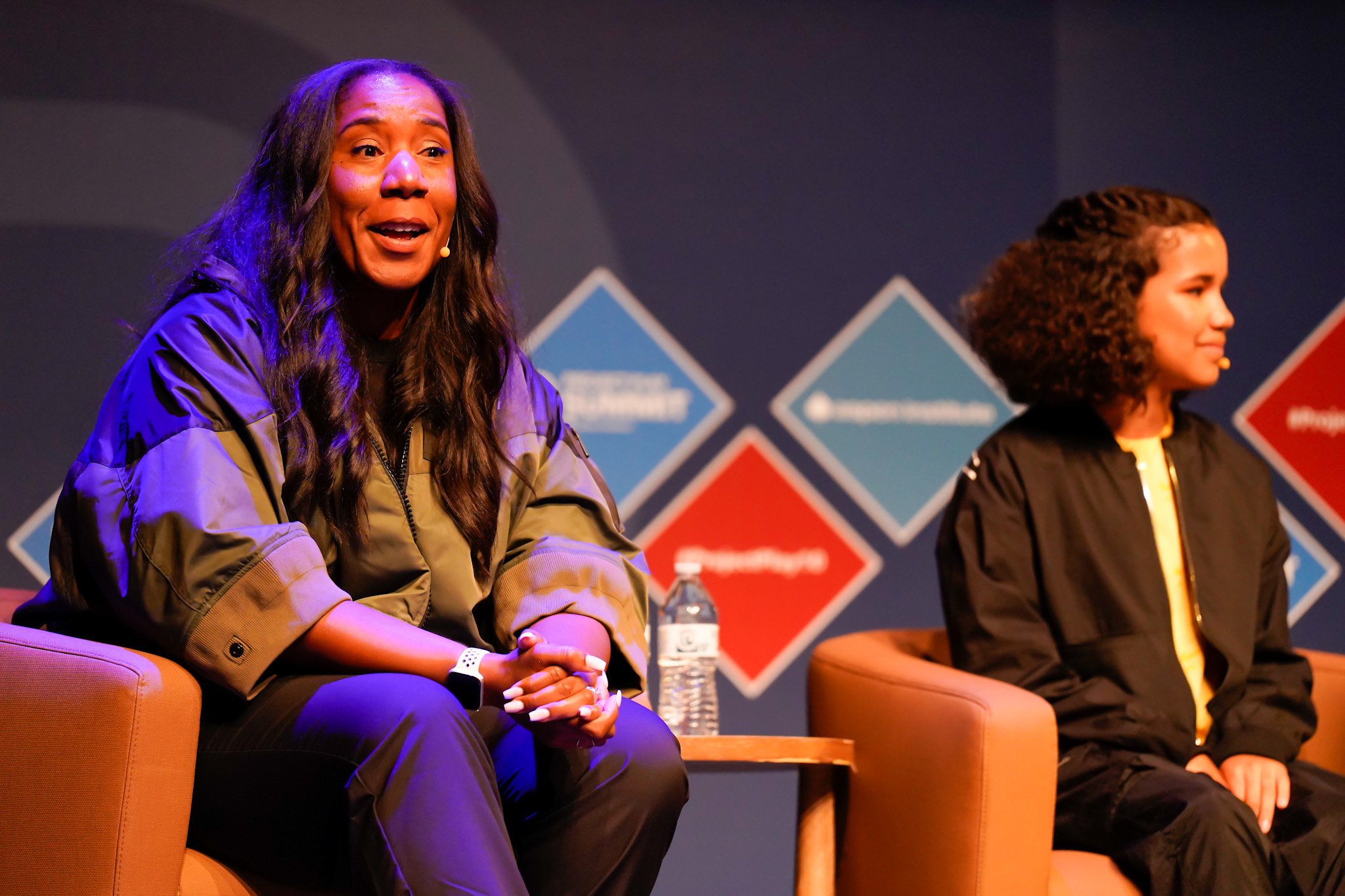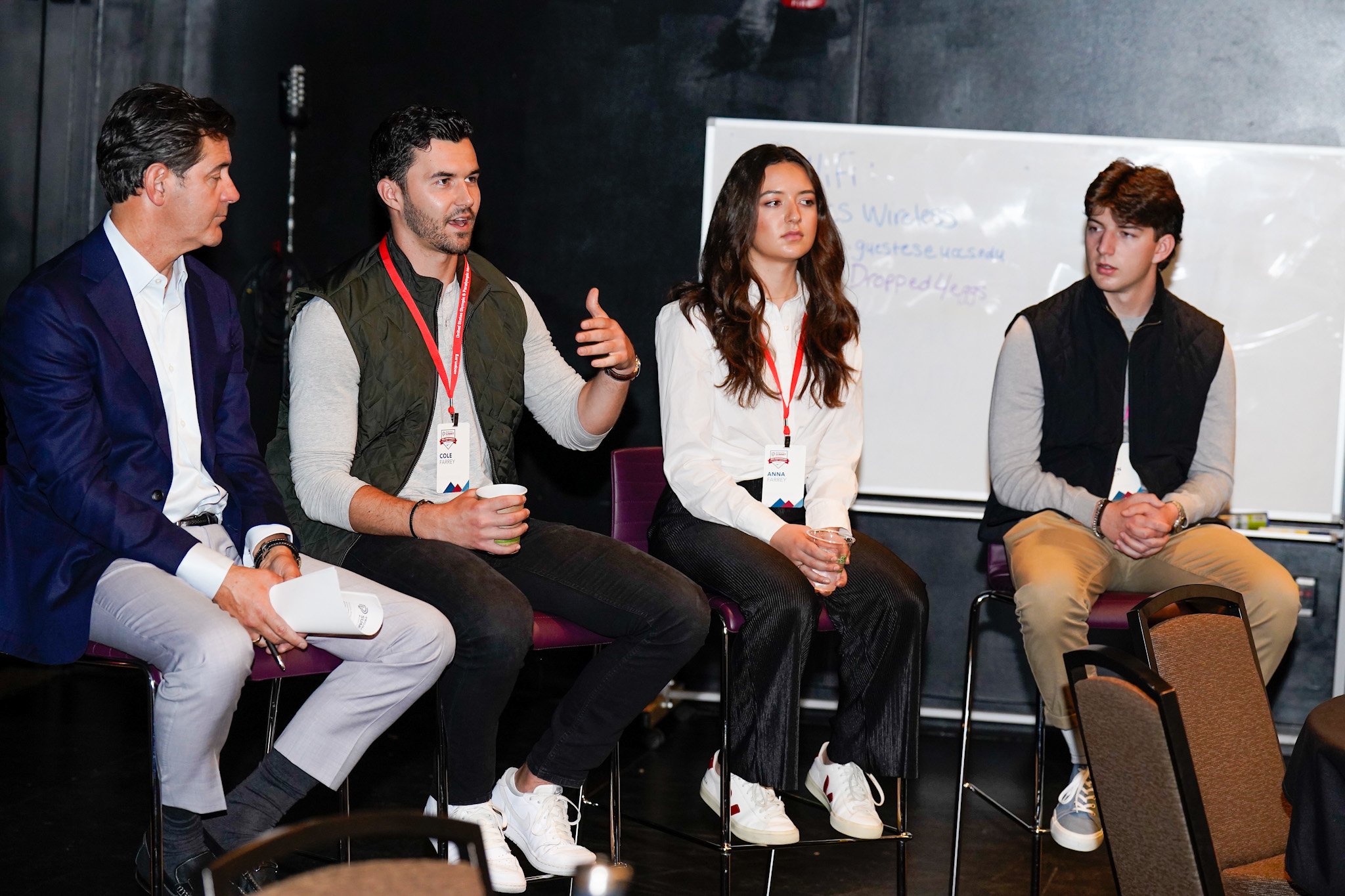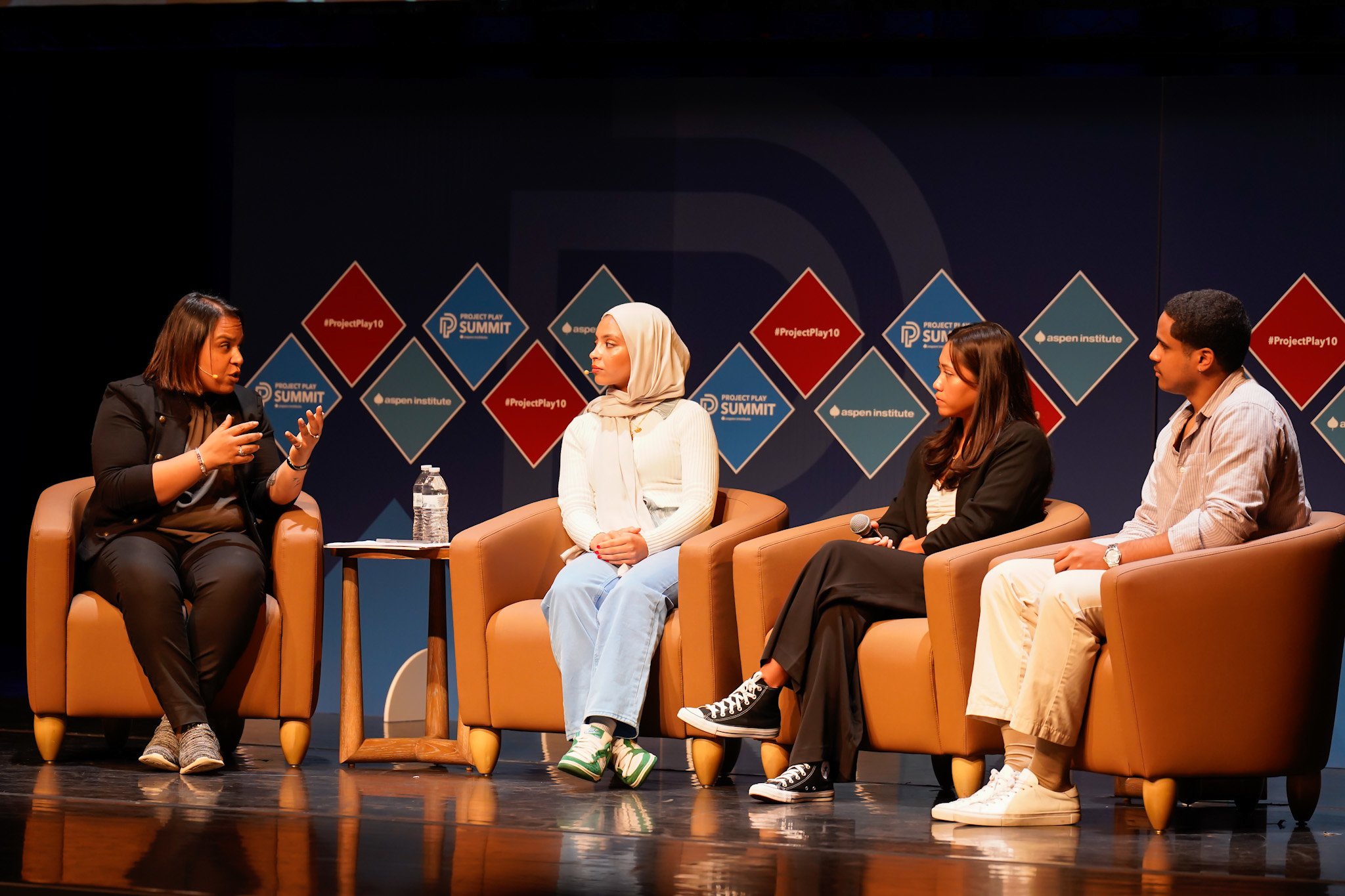Renata Simril, LA84 Foundation CEO (right), speaks on a panel at Project Play Summit 2023. Photo: William Baum
COLORADO SPRINGS, COLORADO – The independent commission set up by Congress to review recent reforms and governance of the U.S. Olympic and Paralympic Committee and its affiliated National Governing Bodies of sport plans to do so with an eye toward how those organizations fit into and contribute to the larger sport ecosystem, a co-chair of the commission said at the Project Play Summit.
In a livestream session, Dionne Koller discussed the scope of the work of the Commission on the State of the U.S. Olympics and Paralympics, and the need for better sports policy. The USOPC and NGBs get their statutory authority from the Ted Stevens Olympic and Amateur Sports Act, the law that created the current U.S. Olympic system in 1978.
“We tend to make sport policy in this country in a very reactive posture, a very crisis-oriented posture,” said Koller, co-chair of the commission. “We’ve made some very important policy changes that way. But this commission is an opportunity to be proactive, and an opportunity to think big.”
The commission held its first listening session this week at the Summit, which marked the 10th anniversary of Project Play and hosted its largest crowd in program history, 625 leaders from across the eight sectors that touch the lives of children. Koller heard from representatives of national sport organizations, community recreation groups, and school sports who shared thoughts on how the USOPC and NGBs can better serve the development of youth sports.
“There’s no way to do that without looking at the original act and accounting for the fact that this is not the 1970s anymore,” Koller said. “I think it’s really important to have an understanding of history, where we’ve been, where sport was at the time, but also where we are today in sports.”
Congress created the 16-member commission as part of a bill that sought better oversight of the Olympic movement in the U.S. The “Empowering Olympic, Paralympic, and Amateur Athletes Act of 2020” came after the Larry Nassar sex-abuse scandal.
Part of the commission’s work includes an analysis of the participation in amateur athletics of women, disabled individuals and minorities. The last Congressional commission examining the role of the Olympic Movement within the larger sport ecosystem came in the mid-1970s, resulting in the Stevens Act that gave the USOPC oversight over amateur athletics in the U.S. In reality, the USOPC mainly focuses on elite athletes given that it is funded by sponsorships and media contracts.
At the Summit, the Aspen Institute shared results from a survey of NGB leaders showing that their organizations want to play a larger role in guiding the grassroots. If the federal government takes a role in improving sports policy, “we as NGBs would be welcome participants in that,” said Kathryn Carson, chair of USA Gymnastics. “There needs to be an understanding of what our role is now and how it’s being expanded. We also need to have additional resources, especially for NGBs who might only have a few people on their staff.”
Rocky Harris, USOPC Chief of Sport and NGB Services, was asked about what an ideal structure for youth sport in this country might include. He said he would “make sure every youth participant is under the umbrella of a national governing body,” noting that “I feel safe and secure sending my daughters to the (NGB) space” given that organizations directly affiliated with them are required to have coaches and staff pass background checks and get trained in SafeSport abuse prevention.
There’s work to do in bridging that gulf, based on insights shared at one breakout session that included 40 people mostly affiliated with parks and recreation departments and community-based organizations. About 80% of the participants in the room said they don’t know anything about what NGBs provide to community-based sports.
“The experience of most in our breakout session is NGBs and the USOPC are about winning medals and elite athletes whereas most community programs are about lifelong fitness and mental and physical health,” said Renata Simril, LA84 Foundation CEO. “How can there be a better alignment? Can there be a youth focus of NGBs that doesn’t compete with the elites?”
The independent commission, which faced a two-year delay getting started, will hold a public hearing Sept. 6 in Washington D.C., with plans to release its report next spring.
“We want to provide the most fair, credible and comprehensive process that’s really ever been done on sport policy in this country,” Koller said.
Announcements at Project Play Summit
Hospital for Special Surgery (HSS) and the Aspen Institute have partnered to form the first national coalition to reduce ACL injuries. The National ACL Injury Coalition envisions a sports ecosystem in which high school participants learn to move better and face fewer threats to serious injury, so they can remain active for life. Coalition members include representatives from Players Health, Datalys Center for Sports Injury Research & Prevention, CDC, US Youth Soccer, New Jersey State Interscholastic Athletic Association, Cedars-Sinai Kerlan-Jobe Institute, National Federation of State High School Associations, Emory University and Major League Soccer. Learn more.
Project Play released the School Sports Equity Toolkit, in partnership with ESPN. Project Play studied youth-led movements in communities lacking opportunities to play sports and created tips to help youth leaders serve their communities. Read the toolkit.
Two more Project Play State of Play community reports were announced for 2024: State of Play Colorado: Aspen to Parachute with Hurst Community Initiative and Colorado Health Foundation, and State of Play Baton Rouge with the Irene W. & C.B. Pennington Foundation. Learn about Project Play community projects.
The Centre for Sport and Human Rights announced a new partnership with Project Play to introduce the Children’s Bill of Rights in Sports in several 2026 FIFA World Cup cities – New York, Los Angeles, Toronto and Guadalajara. Colorado Springs became the latest city to endorse the Children’s Bill of Rights in Sports, joining the NBA as a recent endorser. Read the Bill of Rights.
Project Play is working with the Obama Foundation to survey youth and center their voices in the creation of programming for the future Obama Presidential Center. The survey will inform programming offered at the center, which is scheduled to open in Chicago in 2025.
The U.S. Olympic & Paralympic Committee released the new Quality Parenting Framework, which establishes a common language and principles of high-quality parenting for all skill levels. Review the framework.
The Center for Healing and Justice through Sport released a healing-centered toolkit for coaches. Learn strategies to leverage the unique power sport has to support young people as they navigate the new post-pandemic world. Read the toolkit.
Congratulations to the 2023 Project Play Champions. These are organizations that are taking new, meaningful and specific actions consistent with the Project Play framework. Learn about the 2023 Champions.
Ideas to improve youth sports
The Summit is where we explore solutions to get and keep kids in sports. Here’s a sampling of ideas discussed over the largest Summit in Project Play’s 10-year history:
The city of Colorado Springs started a project in 2021 called Gamechanger, which waived a $78 youth sports registration fee for soccer. Participation more than doubled from 2019 to 2021, and now baseball and softball are also offered for free. In addition, the city’s police department has given away more than 500 balls to kids for free. “Officers deliver the ball to the sports fields, which is how they should be meeting kids for a positive experience,” Mayor John Suthers said.
Nike is focused on creating a sense of belonging for all kids through inclusive innovation and experiences, and coach training to reach more kids – especially girls. Nike created How to Coach Kids, in partnership with Project Play and the USOPC, and continues to expand its collection of free, digital coaching tools including the newly-launched Coaching HER tool, created in partnership with the Tucker Center for Research on Girls and Women in Sport. “As the biggest champion for athletes and sport, Nike is proud to be a founding partner of Project Play, to collectively prioritize access to sport, movement and play for all kids,” said Caitlin Morris, Vice President of Social & Community Impact at Nike. “As we celebrate Project Play’s 10-year milestone, we’re focused on expanding sport for the next generation through inclusive, place-based programming and coach training that prioritizes girls and those who are moving the least – so everyone can reach their potential.”
With parent behavior a problem at youth sports games, the Puyallup (Washington) Parks and Recreation Department created Silent Saturdays at basketball games. Parents can only clap, not cheer or shout comments. “We had pushback the first year until I showed parents the feedback from some random kids who love it,” said Deon Moyd, the city’s recreation supervisor. “It puts in perspective for parents what youth sports is supposed to be about.” Puyallup also uses a Good Sport card that’s handed to any parent who becomes out of control. The card contains a warning that he or she will be asked to leave if the behavior continues. “Either two things happen: They get up and leave or they shut up,” Moyd said. “Our goal is accomplished just by this little card.”
Ask kids what they want
It’s our No. 1 strategy at Project Play. Youth expressed their opinions at the Summit. Here’s a sampling of what they said.
“The hardest thing for me is trying to play multiple sports. I would love it if AAU teams were able to see there are other (sport) options. It’s important kids aren’t selective. It’s something my parents and I have to struggle with to find a team that I can do everything I want to do because I love everything I do, and I don’t want to pick one yet.”
– Pepper Persley, 12-year-old who has participated in basketball, soccer, softball and taekwondo
“I think a lot of times in youth sports we’re focused on outcomes and winning and playing time. The unique thing about Unified Sports is we don’t care about the outcome. The Special Olympics slogan is, ‘Let me win. But if I cannot win, let me be brave in the attempt.’”
– Chloe Johnson, 17-year-old track and field athlete who plays Unified basketball, soccer and softball
“I almost killed myself. I kind of enjoy the pain of skateboarding so I’m going to stick with it no matter what. If it wasn’t for skateboarding, I wouldn’t be here today.”
– Jay Bitsui, skateboarder
Media moments
Olympic reform panel starts work: ‘Opportunity to think big’ (Associated Press)
The importance of youth in sports takes center stage in Colorado Springs (KKTV 11 News)
Colorado Springs adopts Children’s Bill of Rights in Sports (Fox 21 News)
Projected benefits if U.S. lifts youth sports participation goal by 2030: $57 billion (Bruce Y. Lee)
Jon Solomon is editorial director of the Aspen Institute’s Project Play initiative. He can be reached at jon.solomon@aspeninstitute.org.
Photos: William Baum

